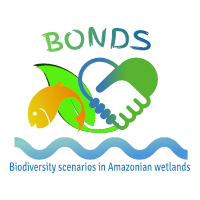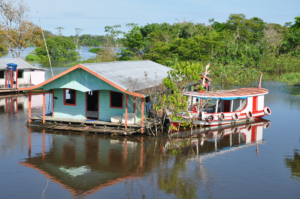Balancing biOdiversity coNservation with Development in Amazonian wetlandS
About us
BONDS “Balancing biOdiversity coNservation with Development in Amazonian wetlandS” from the Belmont Forum and BiodivERsA joint call for research proposals, under the BiodivScen ERA-Net COFUND programme, brings together a consortium of 12 partners from 7 countries (France, Switzerland, Germany, Brazil, USA, Colombia and Norway). It proposes to develop biodiversity scenarios for the Amazon floodplains by combining conservation and development issues. The overall objective is to work with stakeholders to find solutions to preserve biodiversity and ecosystem services in the context of rapid socio-economic and climate changes. The work over 36 months will be organized around three main specific objectives:
- Improving methodologies for the spatial and temporal characterization of floodplain habitats to extrapolate knowledge on biodiversity and assess potential impacts such as climate, land use intensification, dam construction
- Improving knowledge on interactions between local populations and their environment and understanding how they can adapt to change, including socio-demographic and socio-economic changes
- Understanding how public policies and governance contribute to ecosystem conservation and biodiversity conservation. BONDS builds on historical research conducted by consortium members and proposes to extrapolate biodiversity data sets (fish, floodplain forest, phytoplankton) to the regional scale, to assess through modelling the potential impact of changes on species distribution and ecosystem services, and to engage stakeholders in a participatory process for scenario development.
Context
Amazonian “whitewater” river floodplains have long been centers for human settlements. Over the past several decades, unprecedented demographic and economic growths have influenced resource use and challenged capacity to sustain both humans and biodiversity on the floodplain and bordering upland. Threats to the integrity of Amazon floodplain habitats from dams, river navigation networks, extension of the agricultural frontier, and climate change are increasingly severe. However, to date, biodiversity scenarios for the Amazon wetlands have not considered all these critical drivers.
Goals
The overall objective is to work with stakeholders to find solutions enabling preservation of biodiversity and ecosystem services in Amazon floodplain environments under a variety of socio-environmental scenarios, and to provide support for decision-making at local and regional scales. Our research team will build on our collective decades of experience in field work, remote sensing, hydrologic modeling, and engagement with Amazon floodplain communities to 1) Map floodplain and adjacent upland habitats using remote sensing and in situ data, and predict changes in inundation regime under climate change scenarios; 2) Model the interactions between biodiversity, habitat type, hydrology, and management regimes, focusing on floodplain forests, fisheries, and phytoplankton; 3) Engage stakeholders in participatory modeling of multi-scale scenarios, using an agent-based approach; and 4) Disseminate our results to stakeholders and to the broader scientific community
Main outcomes
The BONDS project will produce a significant contribution to floodplain habitat and inundation mapping at an unprecedented spatiotemporal resolution by combining multiple remote sensing products (optical, lidar and radar sensors) at medium to high resolution and will test a novel remote-sensing-based approach for monitoring phytoplankton biodiversity. The use of environmental eDNA metabarcoding will allow examination of the distribution and relative abundance of phytoplankton, zooplankton and fish in floodplain lakes under different levels of protection. Mapping efforts combined with field work and modelling will enable exploring the combined influence of climate variability, dams, and fisheries management on floodplain forest and fish biodiversity, fisheries yields and service provisions (carbon storage and protein provision to local populations). Exploratory scenarios will be built with different types of stakeholders (e.g. local population, commercial fisheries representatives, fishermen and farmers unions) and decision-makers in view of assessing the efficiency of the co-management fisheries protocol applied in the Juruá region (and Amazonas state) in the context of climate change and hydropower development, and to look at optimal co-management protocols to be applied to the more heavily impacted floodplains of the lower Amazon.
Specific activities for dissemination of the project’s outputs will be implemented, including contribution to GEO BON, GEO Wetlands and GBIF databases. Knowledge transfer and involvement of stakeholders (local community associations, fishermen and farmers unions, land managers) into the research will be promoted through their participation into the construction of the conceptual floodplain socio-ecosystem model that will be implemented as a multi-agent-based communication platform. The latter will be further used to explore scenarios with them to look at solutions to improve management.


